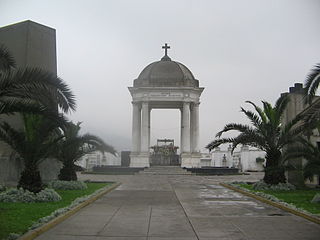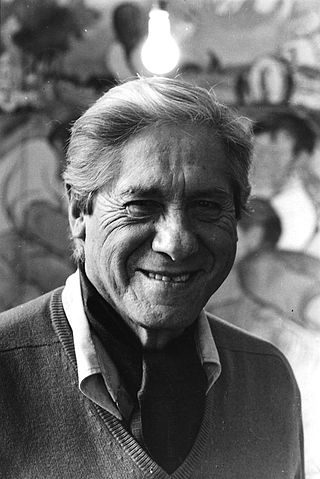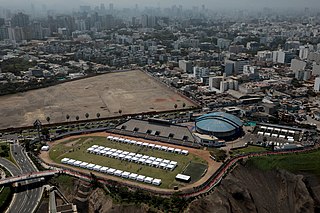
San Isidro is an upscale district of the Lima Province in Peru. It is located in the west center of the city, it has a few meters of coastline. Officially created on April 24, 1931, San Isidro, along with Orrantia and Country Club neighbourhoods, was separated from Miraflores.

Barranco, founded in 1874 as San José de Surco, is one of 43 districts in Lima, Peru. Its current mayor is Jessica Vargas.

The Tarata bombing, known also as the Miraflores bombing or Lima bombing, was a terrorist attack carried out in Tarata Street, located in Miraflores District of Lima, Peru, on 16 July 1992, by the leftist Shining Path terrorist group. The blast was one of the deadliest Shining Path bombings during the Internal conflict in Peru and was part of a larger bombing campaign in the city during the last stage of the terrorism era.

Surquillo is a district located in Lima, Peru. The district is bordered by the districts of San Isidro and San Borja on the north; by Miraflores on the south and west; and by Santiago de Surco on the east.

La Victoria is one of the forty-three districts that make up the province of Lima, located in Peru. It borders to the north and northeast with the district of Lima, to the east with the district of San Luis, to the southeast with the district of San Borja, to the south with the district of San Isidro, and to the west with the district of Lince and again with the Lima district. La Victoria is a historical and very busy public district located in downtown Lima. The current mayor of La Victoria is Rubén Dioscorides Andrés Cano Altez.

San Borja is a district of the Lima Province in Peru, and one of the upscale districts that comprise the city of Lima. Originally part of the district of Surquillo and San Isidro, it became officially established as a separate district on June 1, 1983. The new district took its name from a former hacienda (estate) which dominated the area. The district's postal code is 41. The current mayor (alcalde) is Marco Antonio Álvarez Vargas.

Jesús María is one of the most centrally located districts of Lima, Peru. It is an upper class, high-density district and it usually ranks in the top districts with the best quality of life in Peru with an HDI of 0.8372 (2019), only behind the districts of La Molina and Lince.

Presbyter Matías Maestro Cemetery, formerly the General Cemetery of Lima, is a cemetery, museum and historical monument located in the Barrios Altos neighbourhood of Lima District, in Lima, Peru. Inaugurated on May 31, 1808, it was the first pantheon in the city since burials were previously held in the city's churches. It was named in honour of its designer, Spanish priest Matías Maestro.

Larco Avenue is a major avenue in the district of Miraflores, an affluent district in Lima, Peru.

Dr. Teodoro Núñez Ureta (1912–1988) was a Peruvian painter and a writer, noted for an original and distinctive style in Latin American art. His work often celebrated the life of the simple people of the Andes and the countryside, as distinct from a Spanish colonial legacy which had tended to ignore such topics.

The Palacio Municipal de Lima or City Hall of Lima is a public building that serves as headquarters of the Metropolitan Municipality of Lima. It is located on the street Portal de Escribanos, block 3 of Jirón de la Unión, and in front of the Plaza Mayor of Lima's historic centre.

The Palacio de la Exposición is a building on Colon Avenue in downtown Lima, Peru. It was constructed in the 19th century with the Park of the Exposition to house the International Exposition of Lima in 1872. Since 1957, it has been home to the Lima Art Museum.

The Dos de Mayo Square, known as the Óvalo de la Reina until 1866, is a public square located in Lima, Peru. Located on the southwestern edge of the historic centre's bufferzone, it serves as the junction of several important avenues, including Alfonso Ugarte, La Colmena and Colonial avenues. In the late 20th century, a vehicular tunnel was built under the square to curb traffic congestions.

The Gran Hotel Bolívar is a historic building and three-star hotel located next to San Martín Square in the historic centre of Lima, Peru. Part of a program to modernise the city, it was designed by noted Peruvian architect Rafael Marquina y Bueno and built in state property in 1924 to be the first large, modern hotel built in Lima, and with the specific intent of hosting foreign delegations for the 1924 centennial celebrations of the 1824 Battle of Ayacucho, a decisive military encounter during the Peruvian War of Independence.

The National Superior Autonomous School of Fine Arts is a fine arts school in Lima, Peru. It is located in Barrios Altos, a suburb of Lima District. It was founded in 1918, by President José Pardo y Barreda and Peruvian painter Daniel Hernández, who was its first director. It is located in a monumental building built in the early 1940s.

The Javier Alzamora Valdez Building is located in the historic center of Lima, Peru. It stands at the intersection of Abancay and Colmena avenues, next to the University Park. Formerly the headquarters of the Ministry of Education, it's the main location of the Superior Court of Justice of Lima, part of the Judiciary of Peru.

Tarata Street, known also as the Solidarity Promenade, is a pedestrian street in Miraflores, Lima, Peru. It runs from west to east for 2 blocks, and is located next to José Larco Avenue.

Miraflores Central Park, also known as Miraflores Park, is a public park located in Miraflores, Lima, Peru. It is divided into two parks: John F. Kennedy Park and 7 June Park. The former gives the entire park complex its popular name, Kennedy Park.

The Building of the Ministry of Finance and Commerce is one of the largest buildings located in Abancay Avenue in the historic centre of Lima. Surrounded by Santa Rosa, Cuzco and Ayacucho streets, it serves as the headquarters of the Public Ministry of Peru.

San Martín barracks, originally Junín barracks, was a military installation inaugurated in 1921 to house the Mounted Grenadiers Regiment of the Argentine delegation that visited the country for the Centennial of the Independence of Peru. Located the 13th block of the Avenida del Ejército, it was subsequently closed and auctioned in 2009 and demolished a year later.

























